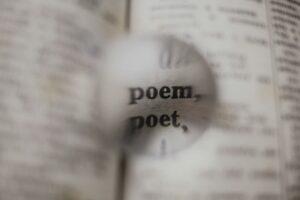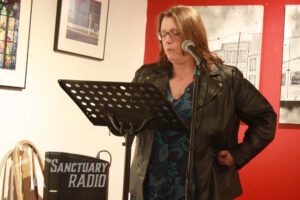I don’t often partake these days, but earlier this year, I submitted a chapbook of new poems to three different contests. It’s an important collection for me, unusually cohesive, and perhaps a little too fresh for me to be objective about. I wanted it to secure the blessings of an outside force. One tool for revision of poetry is to send your “dear ones” away, and then reexamine them with a fresh eye upon return. They almost always return, even the indisputably good ones. That time apart allows for white-hot work to cool off, letting one see clearly what needs to be trimmed, reworded, adjusted, and removed entirely.
Contests can run into a little money too, and frankly, I have nothing to prove to myself or others about my art, so I’m not often inspired to “pay to play.” In most instances, I’d rather take that money and put it into the production of my own chapbooks. Through the miracle of modern technology, I am easily able to print my own covers and text. I even have one of those great big staplers that gives a homemade booklet that professionally homemade finish. I do miss old-school Xerox pamphlets. But I am generally happy with the humble books I can create myself, and my personal satisfaction with the process is off the charts.
I have no issue with contests charging an entry fee, by the way. There are supplies to purchase, postage to secure, and lights to keep on. Ink cartridges, mass email services, and just plain paper have all increased in cost exponentially since the Pandemic, and the corporate greed fest afterward. One local contest, the Stephen A. DiBiase Poetry Contest, is a rare exception on many levels, and in the past few years has managed to attract entries from across the globe. In an exceptionally generous gesture, Bob Sharkey actually supplies prize money out of his own pocket. He has even conscripted his own family to be the judges, as well as the previous year’s First Prize recipient.
It has been implied that, despite the total anonymity of the judging, the results of the DiBiase contest are not diverse enough. Submissions to contests and outside publications, in general, must always be done with a grain of faith, I suppose. And as some have done, if you somehow don’t trust or agree with the way a contest is run, there’s always the option of starting your own. And should results be manipulated to reflect some imagined quota, some arbitrarily fair distribution of awards based on ethnicity, sexuality, and other criteria?
I ran an online poetry contest once, associated with my own blog. It was a simple affair, named in tribute to “Little Sure Shot” herself, Annie Oakley. The winning poems were based on my own (very subjective) tastes in poetry. There was only a 1st, 2nd, and 3rd prize awarded, and the award was the much coveted (!) chance to appear in my blog. All three winners happened to be male, and I received a scathing comment about how sexist the contest was. Am I obligated to select an inferior poem simply to evenly represent all races/sexes/genders/etc.? I personally think not.
It’s about the work for me, plain and simple. I don’t need the names to be able to distinguish between a good and a bad poem. And I don’t need to know personal details about the poet in order to make that determination. To paraphrase Shakespeare (a presumably cis white hetero male), the poem’s the thing.
And that chapbook? It’s come home after three long trips to outside contests. I have revised accordingly, and am now in the process of creating my own chapbook. Now if there were only some open mics around to sell it at!!






Wonderful article, Cheryl